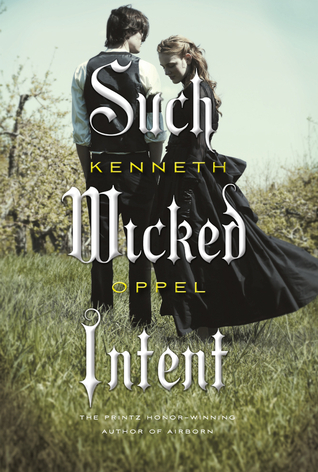Kenneth Oppel returned with a sequel to This Dark Endeavor with Such
Wicked Intent. This book follows the same basic formula as the first:
following Konrad’s death, Victor swears off of alchemy and burns the Dark
Library, vowing to himself that he will abstain from all that he believes resulted
in his twin’s demise. This includes leaving Elizabeth, Konrad’s betrothed,
alone. Of course, we can’t have these things stay like this for forever, and
all too soon Victor is presented with a doorway into the spirit world, where he
finds his brother still trapped in an alternate version of their home.
Once again, Victor, Elizabeth, and Henry are working against
the clock to save Konrad. This time though, it’s from a far larger threat which
stems from their past – their ancestor’s past, that is. There’s no fan service
with a pop in from another historical face like there was with Dr. Polidori in
the first book, but instead the story this time focuses more on the idea of
bringing someone back to life. Much like the first book, it riffs off of the
original Frankenstein mythos, but takes it in a new direction. Rather than
being obsessed with dead flesh and the re-ignition of life, Victor and company
are introduced to a more Promethean kind of creation: clay.
The group finds a strange underground passage beneath the
family dwelling, one that’s full of catacombs and primitive drawings on the
walls. Further exploration reveals a kind of burial ground, where one large and
obviously revered grave is set. In the mortal plane, everything looks normal
and somewhat dull, but in the otherworldly setting, the grave pulses and gives
off a sort of life. It also sprouts out black butterflies, the reasoning for
which I won’t explain here since it will give away part of the ending. However,
the description of all of this is basically the best part of the book – once
again the subject matter is brought to life with tight and elegant prose,
something I absolutely love Oppel for.
Still, things are not as simple as they seem and the process
of creation, which seemed straight-forward, turns out to be working against
them for there’s another presence in the otherworldly house. Deep within the
house itself lies another dormant soul, one that’s looking to get out, and
plans to use what Victor and his friends are using to save his brother. All in
all, it quite veers away from what we all know as Frankenstein; while it still
deals within the realm of alchemy and the occult, I was surprised to see this
kind of…I don’t know, spiritualism come into play? But I had to keep reminding
myself that this was not the Frankenstein
mythos but a retelling or reconjuring of it.
Many other reviewers have called this sequel much darker
than its predecessor, and that’s not without truth. Victor, Elizabeth and Henry
are really dabbling with life and death in this book, and it even goes so far
as to change one of their personalities. Other, darker topics are touched upon.
The way the book flows had me believing that it would end in one fashion, but
then I was surprised to see that it was not. Rather, it was left open for
another sequel, which left me feeling a little miffed. I thought it would be a
natural course of events for the book to take a closer leaning toward the
mythos by introducing the Creature, but it does not (or rather it seems to for
a moment, but then dashes those hopes).
The ending of the book hints more at the Victor we all know,
which left me asking why this book was made at all – it seems like a detour on
the way to a larger story. Hopefully Oppel can clear up the reasoning behind
this bit, but all in all it’s still an enjoyable read.


No comments:
Post a Comment